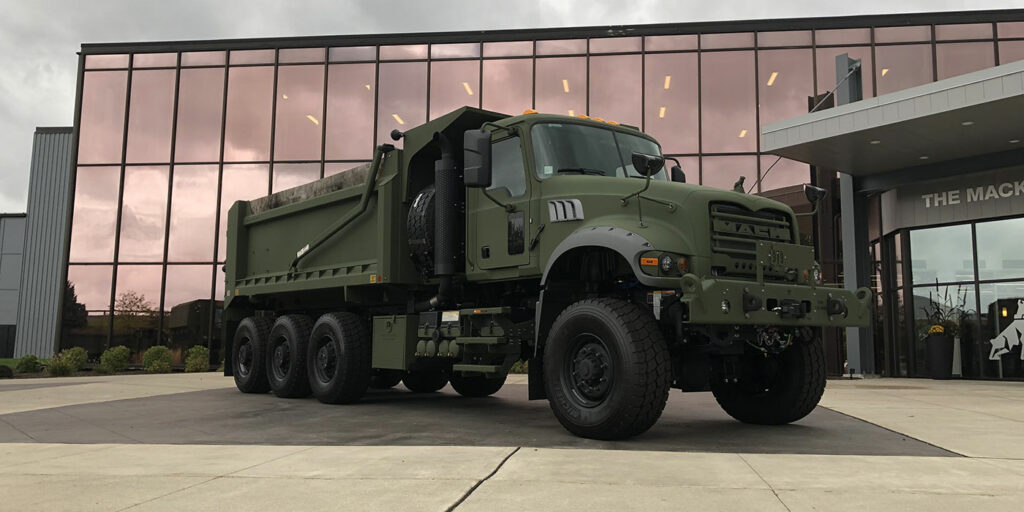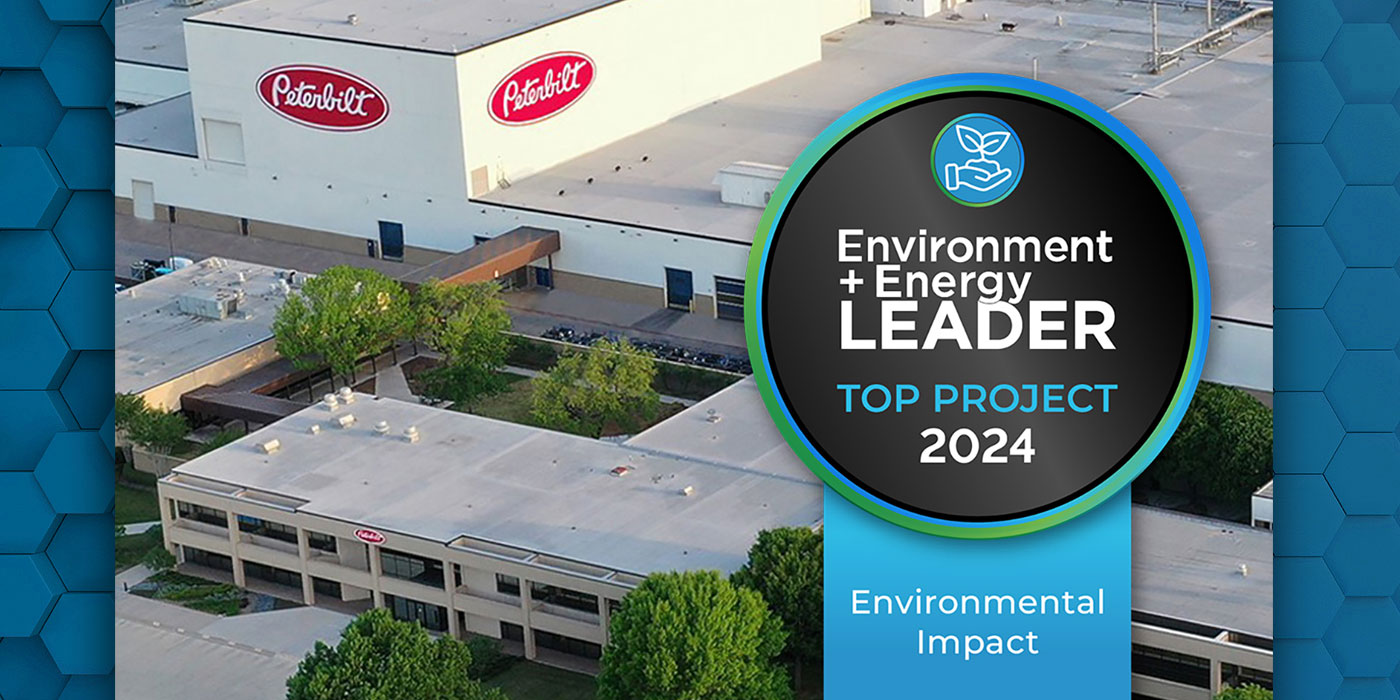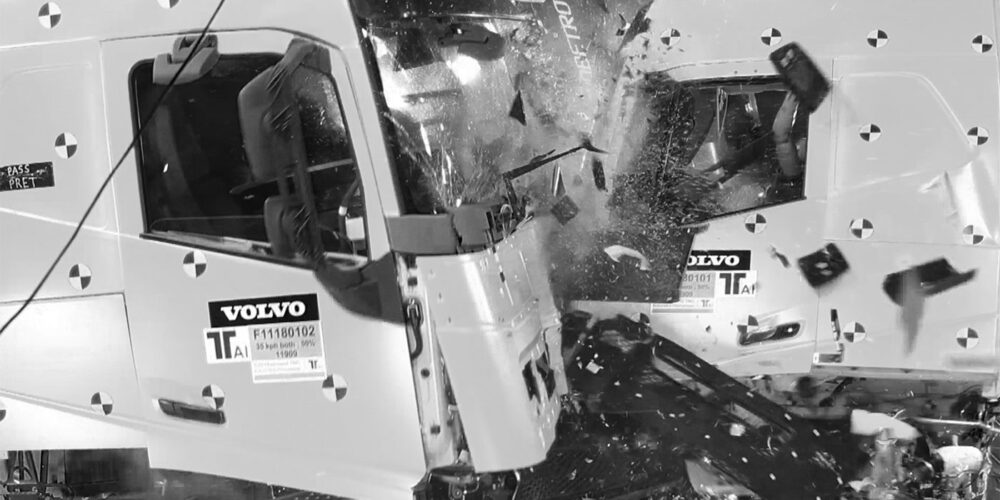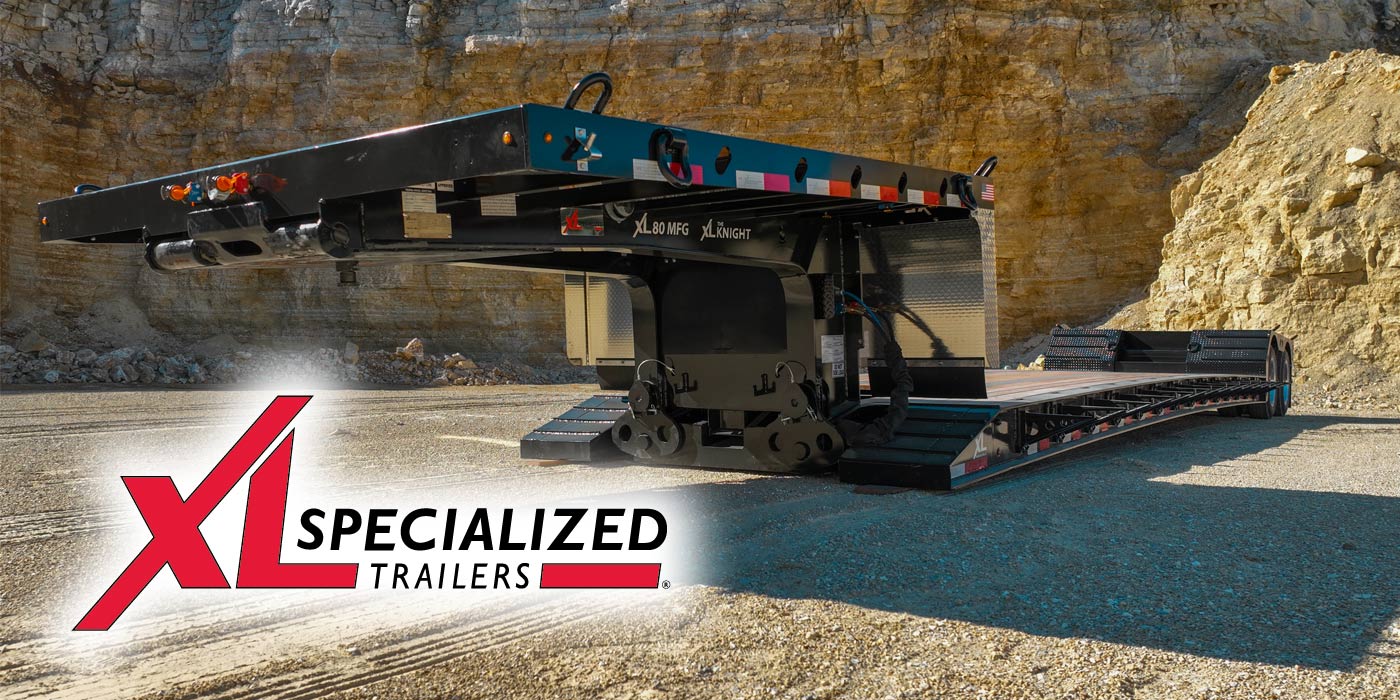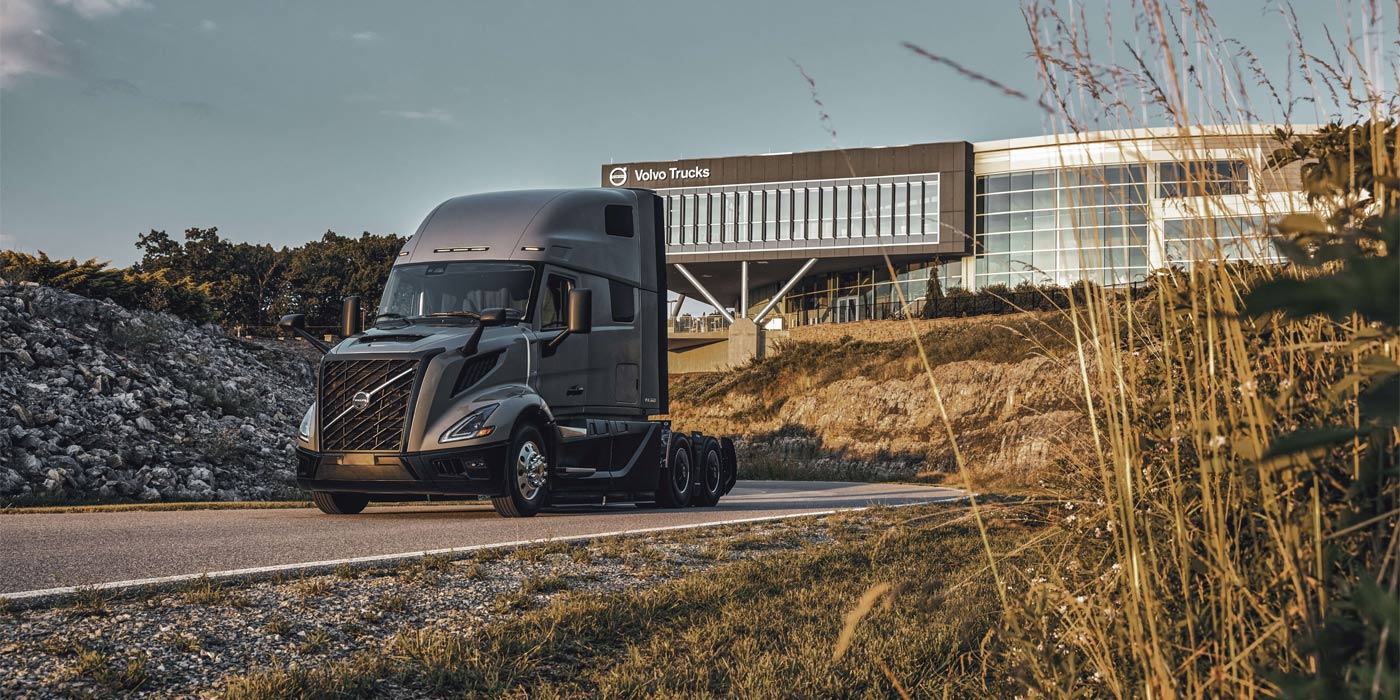Mack Defense delivered to the U.S. Army and the U.S. Army Reserve the first production M917A3 Heavy Dump Trucks (HDT) to roll off Mack Defense’s new production line at the Mack Experience Center (MEC) in Allentown, Pa., on Sept. 23. The M917A3 HDT key and truck handover occurred during a ceremony at the MEC, following remarks from Mack Defense leadership, U.S. Army officials and representatives of local and state officials. Attendees were also provided a tour of Mack Defense’s new production facility.
“It’s an honor to write the next chapter in Mack’s rich history of producing vehicles for the U.S. armed forces on this dedicated line and deliver the first, new Heavy Tactical Wheeled Vehicle the U.S. Army has added to their portfolio in 12 years,” said David Hartzell, president of Mack Defense.
Based on the commercially available vocational Mack Granite model, the M917A3 trucks are part of the contract for HDTs that was previously announced between the U.S. Army and Mack Defense. The Army uses dump trucks in its engineer units, and they are key in construction and maintenance missions for important infrastructure assets, like roadways, airfields, landing strips, supply facilities and motor pools, says Wolfgang Petermann, the U.S. Army’s project manager for transportation systems, Program Executive Office for Combat Support & Combat Service Support (Detroit Arsenal, Mich.).
“Army engineers are an important asset, and this vehicle will enable them to carry out these construction missions more efficiently,” Petermann said. “What does that mean? Repairing runways, building roads – all those horizontal-type activities. Many of the Army’s missions are within extremely austere environments, so if we need to build things to support combat or training operations, dump trucks are absolutely essential to the force.”
The Army’s current dump truck fleet includes some variants that are nearly 50 years old, Petermann added.
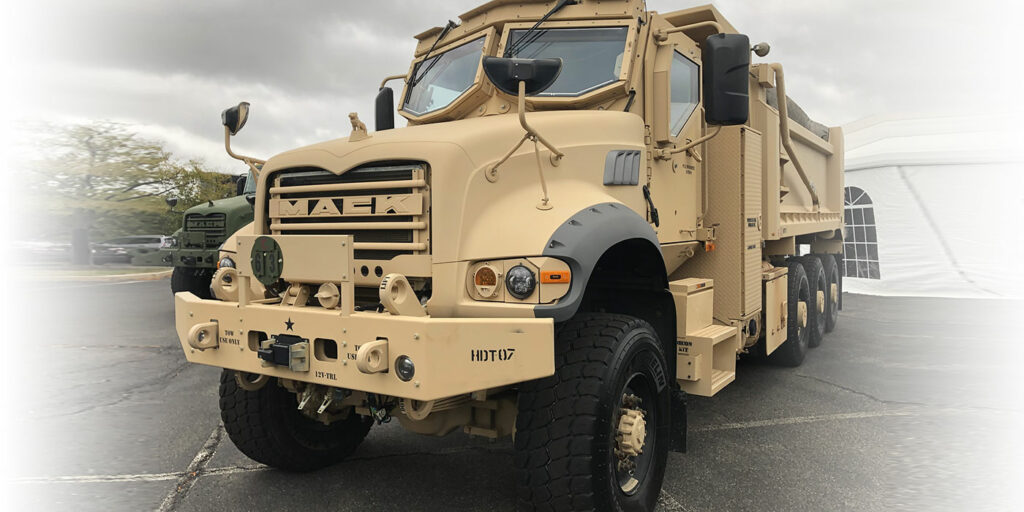
The 94,500 lb. GVWR M917A3 HDTs based on the Mack Granite model feature an all-wheel-drive 8×8 configuration. Mack Defense says its engineers increased the suspension’s ride height to create a heavy dump truck capable of meeting the demanding payload and mobility requirements set by the U.S. Army HDT program. An armored cab was also engineered, utilizing all the comfort features and amenities of a commercial truck, while adding force protection to help keep occupants safe in hostile environments. The M917A3s are powered by 13-liter Mack MP8 engines, delivering 440 HP and 1,660 lb.-ft. of torque. The vehicle has a 27-ton payload without armor installed and a 22.5-ton payload when fully armored.
“The capability (of this vehicle) meets our requirements, is affordable, and is sustainable into the future,” says Andrew DiMarco, acting program executive officer for Combat Support and Combat Service Support with the U.S. Army. “The heavy dump truck is a great example of where we bring an interception of commerciality, with somewhere in the neighborhood of 75-80% commonality with Mack commercial trucks, with military-unique requirements like off-road capabilities and survivability.”
While the Mack Granite model is already designed for harsh jobsite applications, Mack Defense engineers made modifications to enhance these capabilities in the HDT. Engineers added heavy-duty rear axles, all-wheel drive and increased ride height suspension to provide the Army with a heavy dump truck that would meet payload and mobility requirements.
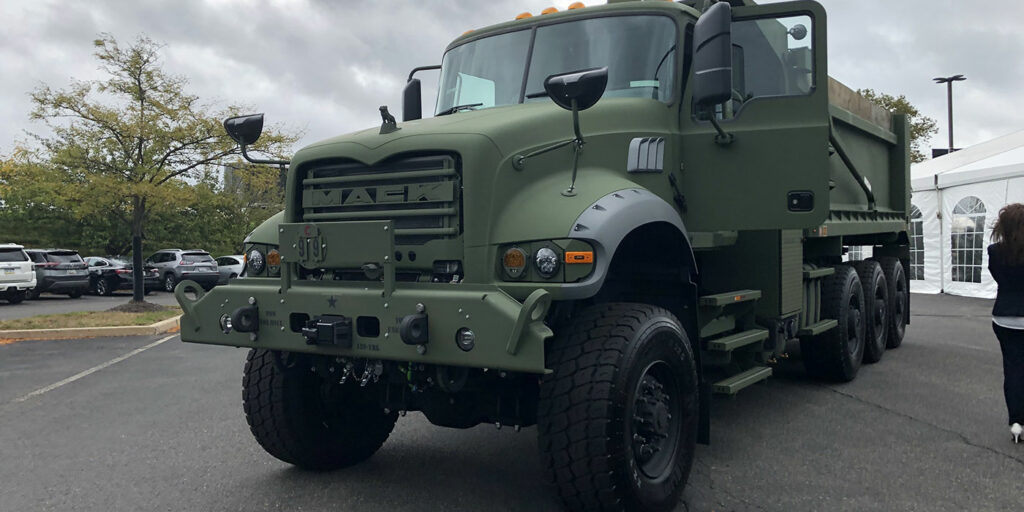
The HDT also features active safety systems such as active blindspot detection, forward-looking collision avoidance and anti-lock brakes which Hartzell said were requirements by the Army. However, the Army specifically did not ask for a telematics gateway like Mack’s GuardDog Connect solution to be installed, due to needing more stringent security requirements than are currently available for commercial vehicles.
“They recognize the benefits of having something where they can remotely monitor the vehicle if there’s maintenance or faults,” Hartzell said. “The Army – especially the Reserve and the National Guard – is noticing that many times these vehicles are being operated domestically, so they say ‘why wouldn’t we take advantage of that?’ Then, if they get into a situation where it’s a state of emergency, they want to disable that system so they can turn it off and lose the connectivity. They don’t want people tracking or cyber-hacking their vehicles.”
Production of the HDTs at the MEC began in Q1 2021, following an investment of $6.5 million to create a dedicated HDT production line at the facility. The new production line helps fulfill the HDT contract with the U.S. Army and allows the production of other vehicle variants.
The production line in the MEC is in Mack’s former Customer Adaptation Center, where vehicle modifications occurred. The Customer Adaptation Center has since moved to Mack’s Lehigh Valley Operations (LVO) in Macungie, Pennsylvania, where all Mack Trucks Class 8 vehicles for North America and those that are exported are assembled. Previously, non-armored HDT vehicles started production at LVO and were then transported to the MEC, where final assembly, including adding the dump body, occurred.
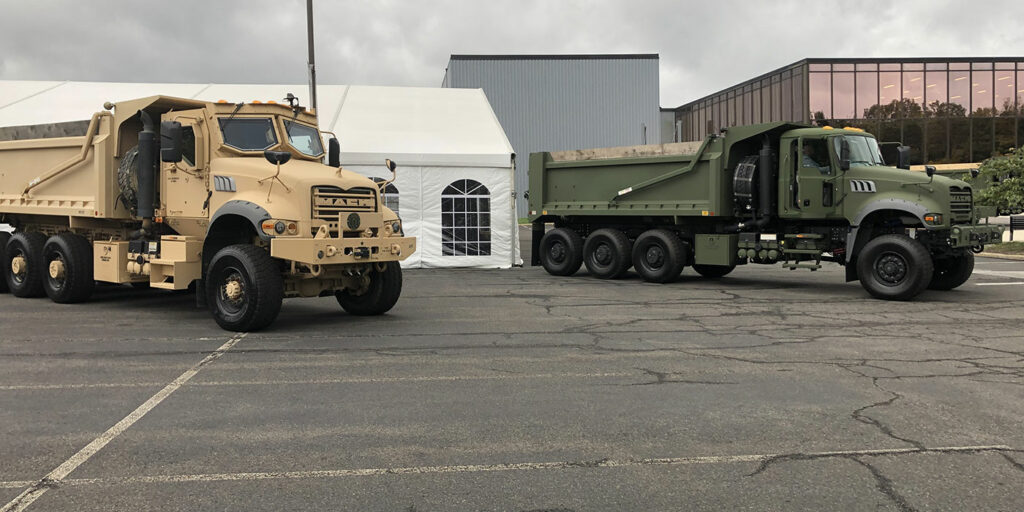
Mack Defense also partnered with several suppliers to help this vehicle. The company went to Crysteel for the HDT’s dump body coupled with Crysteel’s material control system tailgate. Meritor Defense was tapped for the front and rear axles, brake systems, transfer case and driveshafts. Hendrickson supplies the rear suspension system, and JWF Defense fabricates the armored cab plus over 30 other parts, sub-assemblies and CARC (Chemical Agent Resistant Coating) painting expertise used on each model.
In May 2018, the U.S. Army awarded Mack Defense the contract that could be worth up to $296.4 million over seven years to produce up to 683 non-armored and armored M917A3 HDTs. The U.S. Army signed the agreement Nov. 30, 2020 to purchase 99 Mack Granite-based HDT’s after completing two years of successful production vehicle testing of 12 vehicles at the U.S. Army’s Aberdeen Test Center in Aberdeen, Maryland in accordance with the contract program timeline. Then, on March 29, 2021 an additional order of 56 HDTs were placed as part of the 2021 presidential budget.

